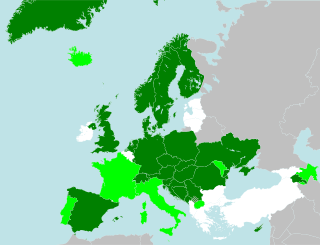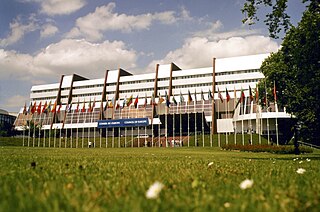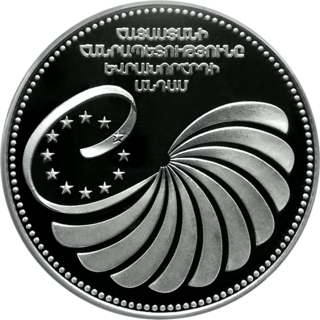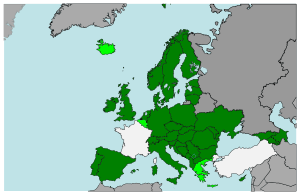
The Council of Europe is an international organisation with the goal of upholding human rights, democracy and the rule of law in Europe. Founded in 1949, it brings together 46 member states with a population of approximately 675 million as of 2023; it operates with an annual budget of approximately 500 million euros.

The European Charter for Regional or Minority Languages (ECRML) is a European treaty adopted in 1992 under the auspices of the Council of Europe to protect and promote historical regional and minority languages in Europe. However, the charter does not provide any criterion or definition for an idiom to be a minority or a regional language, and the classification stays in the hands of the national state.

The European Convention on Human Rights is an international convention to protect human rights and political freedoms in Europe. Drafted in 1950 by the then newly formed Council of Europe, the convention entered into force on 3 September 1953. All Council of Europe member states are party to the convention and new members are expected to ratify the convention at the earliest opportunity.
International human rights instruments are the treaties and other international texts that serve as legal sources for international human rights law and the protection of human rights in general. There are many varying types, but most can be classified into two broad categories: declarations, adopted by bodies such as the United Nations General Assembly, which are by nature declaratory, so not legally-binding although they may be politically authoritative and very well-respected soft law;, and often express guiding principles; and conventions that are multi-party treaties that are designed to become legally binding, usually include prescriptive and very specific language, and usually are concluded by a long procedure that frequently requires ratification by each states' legislature. Lesser known are some "recommendations" which are similar to conventions in being multilaterally agreed, yet cannot be ratified, and serve to set common standards. There may also be administrative guidelines that are agreed multilaterally by states, as well as the statutes of tribunals or other institutions. A specific prescription or principle from any of these various international instruments can, over time, attain the status of customary international law whether it is specifically accepted by a state or not, just because it is well-recognized and followed over a sufficiently long time.

The BernConvention on the Conservation of European Wildlife and Natural Habitats, also known as the Bern Convention, is a binding international legal instrument in the field of Nature Conservation, it covers the natural heritage in Europe, as well as in some African countries. The Convention was open for signature on 19 September 1979 and came into force on 1 June 1982. It is particularly concerned about protecting natural habitats and endangered species, including migratory species.

The Copenhagen criteria are the rules that define whether a country is eligible to join the European Union. The criteria require that a state has the institutions to preserve democratic governance and human rights, has a functioning market economy, and accepts the obligations and intent of the European Union.

The Convention on the Elimination of all Forms of Discrimination Against Women (CEDAW) is an international treaty adopted in 1979 by the United Nations General Assembly. Described as an international bill of rights for women, it was instituted on 3 September 1981 and has been ratified by 189 states. Over fifty countries that have ratified the convention have done so subject to certain declarations, reservations, and objections, including 38 countries who rejected the enforcement article 29, which addresses means of settlement for disputes concerning the interpretation or application of the convention. Australia's declaration noted the limitations on central government power resulting from its federal constitutional system. The United States and Palau have signed, but not ratified the treaty. The Holy See, Iran, Somalia, Sudan, and Tonga are not signatories to CEDAW.

The Committee of Ministers of the Council of Europe or Committee of Ministers is the Council of Europe's decision-making body. It comprises the Foreign Affairs Ministers of all the member states, or their permanent diplomatic representatives in Strasbourg. It is both a governmental body, where national approaches to problems facing European society can be discussed on an equal footing, as well as a collective forum, where Europe-wide responses to such challenges are formulated. In collaboration with the Parliamentary Assembly, it is the guardian of the Council's fundamental values; it monitors member states' compliance with their undertakings. The Holy See, Japan, Mexico, and the US are observer states in the Committee of Ministers.
Minority rights are the normal individual rights as applied to members of racial, ethnic, class, religious, linguistic or gender and sexual minorities, and also the collective rights accorded to any minority group.
The European Bureau for Lesser-Used Languages (EBLUL) was a non-governmental organisation that was set up to promote linguistic diversity and languages. It was founded in 1982 and discontinued in 2010. The organisation had close ties with both the European Parliament and the Council of Europe, and was funded by both the European Commission and local and regional governmental organisations.
Linguistic rights are the human and civil rights concerning the individual and collective right to choose the language or languages for communication in a private or public atmosphere. Other parameters for analyzing linguistic rights include the degree of territoriality, amount of positivity, orientation in terms of assimilation or maintenance, and overtness.

Human rights in Latvia are generally respected by the government, according to the US Department of State and Freedom House. Latvia is ranked above-average among the world's sovereign states in democracy, press freedom, privacy and human development. The country has a relatively large ethnic Russian community, which has basic rights guaranteed under the constitution and international human rights laws ratified by the Latvian government.
Human rights in Estonia are acknowledgedas being generally respected by the government. Nevertheless, there are concerns in some areas, such as detention conditions, excessive police use of force, and child abuse. Estonia has been classified as a flawed democracy, with moderate privacy and human development in Europe. Individuals are guaranteed on paper the basic rights under the constitution, legislative acts, and treaties relating to human rights ratified by the Estonian government. As of 2023, Estonia was ranked 8th in the world by press freedoms.
Expression of racism in Latvia include racist discourse by politicians and in the media, as well as racially motivated attacks. European Commission against Racism and Intolerance notes some progress made in 2002–2007, mentioning also that a number of its earlier recommendations are not implemented or are only partially implemented. The UN Special Rapporteur on contemporary forms of racism, racial discrimination, xenophobia and related intolerance highlight three generally vulnerable groups and communities: ethnic Russians who immigrated to Latvia under USSR, the Roma community and recent non-European migrants. Besides, he notes a dissonance between "opinion expressed by most State institutions who view racism and discrimination as rare and isolated cases, and the views of civil society, who expressed serious concern regarding the structural nature of these problems".

The Council of Europe Convention on Preventing and Combating Violence Against Women and Domestic Violence, better known as the Istanbul Convention, is a human rights treaty of the Council of Europe opposing violence against women and domestic violence which was opened for signature on 11 May 2011, in Istanbul, Turkey. The convention aims at prevention of violence, victim protection and to end the impunity of perpetrators.
European Foundation of Human Rights or EFHR is an organization established in 2010 in Lithuania in response to the increasing number of human rights violations within the country of Lithuania, and more specifically regarding the rights of ethnic minorities.

The European Convention for the Protection of Animals kept for Farming Purposes, also known as the Farm Animal Convention, is an animal welfare treaty of the Council of Europe, adopted on 10 March 1976 in Strasbourg, and effective since 10 September 1978.

European Convention for the Protection of Animals during International Transport refers to two animal welfare treaties regarding livestock transportation of the Council of Europe:

Armenia has been a member of the Council of Europe, an international organization that focuses on strengthening democracy, human rights, and the rule of law across Europe, since 2001.












